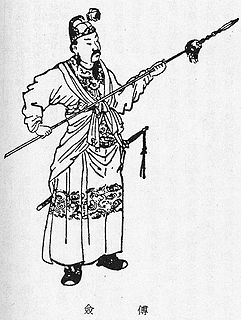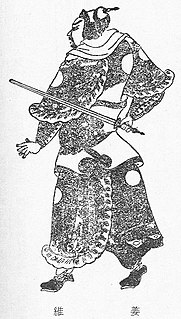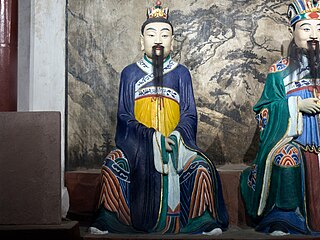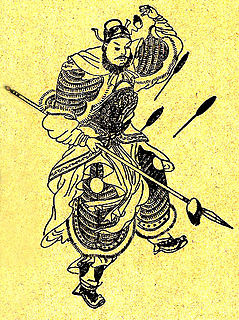 W
WCheng Ji, courtesy name Jiran, was a military officer of the state of Shu Han during the Three Kingdoms period of China. He previously served under the warlord Liu Zhang during the late Eastern Han dynasty.
 W
WDeng Ai, courtesy name Shizai, was a Chinese military general and politician of the state of Wei during the Three Kingdoms period of China. He is best known for his pivotal role in the Wei conquest of its rival state, Shu, in 263. He was described as a very loyal subject who made great contributions to Wei, but was also noted for his arrogance and audacity, which led to his downfall and death.
 W
WFeng Xi, courtesy name Xiuyuan, was a military general of the state of Shu Han in the Three Kingdoms period.
 W
WFu Qian was a military general of the state of Shu Han in the Three Kingdoms period of China. He was the son of Fu Rong.
 W
WFu Rong was a military officer of the state of Shu Han during the Three Kingdoms period of China.
 W
WJiang Wei, courtesy name Boyue, was a military general of the state of Shu during the Three Kingdoms period of China. Born in Ji County, Jiang Wei started his career as a military officer in his native Tianshui Commandery, which was a territory of Wei. In 228, when Wei's rival state Shu launched an invasion led by Zhuge Liang, Jiang Wei was distrusted by Ma Zun, then administrator of Tianshui Commandery. As such, Jiang Wei had to defect to Shu. Zhuge Liang, the Imperial Chancellor and regent of Shu, highly regarded Jiang Wei and appointed him as a general in Shu. After Zhuge Liang's death in 234, Jiang Wei continued serving as a military commander during the regencies Jiang Wan and Fei Yi, eventually rising to the highest military rank of General-In-Chief (大將軍) after Fei Yi’s death in 253. Between 240 and 262, he continued Zhuge Liang's legacy of waging war against Wei by leading another 11 military campaigns. However, Jiang Wei’s campaigns were relatively constrained in terms of both scale and duration due to Shu’s limited resources and inadequate food supplies, as well as internal political faultlines. In 263, when Wei launched a massive invasion of Shu, Jiang Wei led Shu forces to resist the invaders at Tazhong, Yinping and Jiange, himself defending Jiange which was under Zhong Hui’s attack. While Jiang Wei managed to temporarily stall Wei’s main force led by Zhong Hui, Deng Ai, another military commander of Wei, took a shortcut via Yinping and showed up at Chengdu unexpectedly. Liu Shan surrendered to Deng Ai without putting up resistance and ordered Jiang Wei to surrender to the Wei general Zhong Hui; this event marked the end of Shu's existence. In the following year, Jiang Wei instigated Zhong Hui to launch a rebellion in Chengdu against the Wei regent Sima Zhao and hoped to use the opportunity to gain military power and restore Shu. However, some of Zhong Hui's officers were unwilling to participate in the rebellion and started a mutiny, killing Jiang Wei and Zhong Hui.
 W
WMa Liang (187–222), courtesy name Jichang, was an official serving under the warlord Liu Bei during the late Eastern Han dynasty of China. He was the elder brother of Ma Su. Since he was young, Ma Liang was famous for his exceptional talent with Chen Shou describing him as one of Shu's best officials unfortunately he suffered a tragic death at the young age of 35 years at the Battle of Xiaoting. He served in the state of Shu Han as one of the founding emperor Liu Bei’s Palace Attendant during the early Three Kingdoms period.
 W
WShamoke was a tribal chieftain who lived in Wuling Commandery in the late Eastern Han dynasty and Three Kingdoms period of China. He allied with the Shu Han state during the Battle of Xiaoting of 221–222 against the Eastern Wu state and was killed in battle.
 W
WWang Shuang, courtesy name Ziquan, was a military officer of the state of Cao Wei during the Three Kingdoms period of China. He initially participated in battles against Wei's rival state Eastern Wu but was defeated and captured. Later, he rejoined Wei and was reassigned to the western front to fight against Wei's other rival state, Shu Han. He was killed in battle against Shu forces.
 W
WXiahou Ba, courtesy name Zhongquan, was a military general of the state of Cao Wei in the Three Kingdoms period of China. He was the second son of Xiahou Yuan, a prominent general who served under Cao Cao, the warlord who laid the foundation for the state of Cao Wei. Around 249, Xiahou Ba defected to Wei's rival state, Shu Han, after the regent Sima Yi seized power in a coup d'état. He was killed in battle sometime between 255 and 259 against Wei forces.
 W
WXiang Chǒng was a military officer of the state of Shu Han during the Three Kingdoms period of China.
 W
WZhang He, courtesy name Junyi, was a military general serving under the warlord Cao Cao in the late Eastern Han dynasty of China. He continued serving in the state of Cao Wei under its first two rulers, Cao Pi and Cao Rui, during the Three Kingdoms period until his death.
 W
WZhang Nan, courtesy name Wenjin, was a military officer of the state of Shu Han in the Three Kingdoms period of China.
 W
WZhang Ni, courtesy name Boqi, was a military general of the state of Shu Han during the Three Kingdoms period of China. Famous for his courage and generosity, Zhang Ni made his name known while rescuing a magistrate's wife from bandits and leading her to safety. Often working with Ma Zhong He was instrumental in pacifying the indigenous tribes residing within and around the border of Shu. He spent at least 18 years dealing with the continuum of domestic uprisings around Yuexi/Yuesui and Ba commanderies though he was a talented general, Zhang Ni often looked for humane solutions and sought to make peace or negotiate with foreign tribes when he could. Thanks to his upright attitude, those tribes loved him, weeping and grabbing hold of his carriage when they learned he would be leaving. Feeling he was growing weak and old, Zhang Ni gave a stirring speech asking to give him a chance to repay his lord's largesse or die trying. Liu Shan was moved to tears by his speech. During one of Jiang Wei's Northern Expeditions, he was killed in battle by the Wei general Xu Zhi though he killed and injured numerous Wei soldiers. When they learned of his death, none among the Han or foreign clan of Yuexi did not weep with grief. After his death, they established a temple for him and brought offerings even in times of famine and hardship. Respected, even revered. Liu Shan compared him to the great heroes of antiquity and Chen Shou thought he was not so far. His name is sometimes rendered as Zhang Yi.
 W
WZhang Yi, courtesy name Bogong, was a military general of the state of Shu Han during the Three Kingdoms period of China. Born in the late Eastern Han dynasty, Zhang Yi was a 10th-generation descendant of Zhang Liang. He started his career as a scribe under the warlord Liu Bei, who founded Shu later, and gradually rose to the positions of a county prefect and commandery administrator. In the early 230s, he served as an area commander tasked with maintaining the peace in Shu's southern commanderies. In 234, he led the Shu vanguard during the Battle of Wuzhang Plains against Shu's rival state Wei. From 238 to 259, Zhang Yi steadily rose through the ranks to become one of Shu's top generals. During this time, although he strongly opposed the Shu general Jiang Wei's aggressive stance towards Wei, he still accompanied Jiang Wei on his military campaigns against Wei. In 263, he surrendered to Wei forces along with the Shu emperor Liu Shan when Wei launched a large-scale invasion of Shu. In the following year, Zhang Yi was killed by mutineers during a rebellion by the Wei general Zhong Hui. Like Liao Hua and Zong Yu, Zhang was one of few officials who served the Shu-Han state throughout its entire existence.
 W
WZhong Hui, courtesy name Shiji, was a Chinese calligrapher, essayist, military general, and politician of the state of Cao Wei during the Three Kingdoms period of China. He was the younger son of Zhang Changpu with Zhong Yao, who served as the Grand Tutor in the Wei imperial court. He was already known for being insightful, intelligent and knowledgeable since he was young. Zhong Hui rose to prominence in the 250s when he became a close aide to Sima Zhao, the regent and de facto ruler of Wei. He advised Sima Zhao on how to deal with the Third Rebellion in Shouchun from 257–258 and was highly regarded by the latter. With Sima Zhao's help, Zhong Hui steadily moved up the ranks and became one of the key figures in the Wei government.
 W
WZhuge Shang was a military officer of the state of Shu Han in the Three Kingdoms period of China. He was the eldest son of the Shu general Zhuge Zhan and a grandson of Zhuge Liang, the first Chancellor of Shu.
 W
WZhuge Zhan (227–263), courtesy name Siyuan, was a military general and official of the state of Shu Han during the Three Kingdoms period of China. He was a son of Zhuge Liang, the first Imperial Chancellor of Shu.